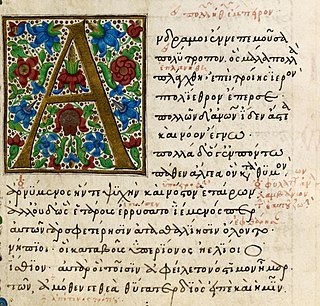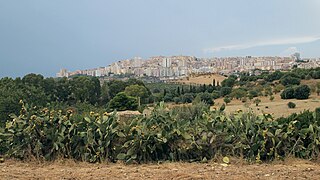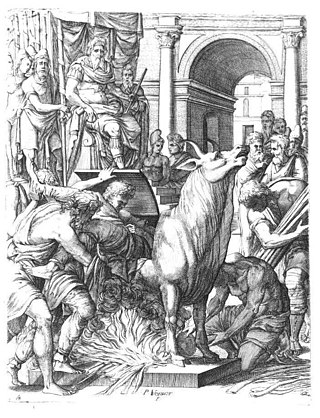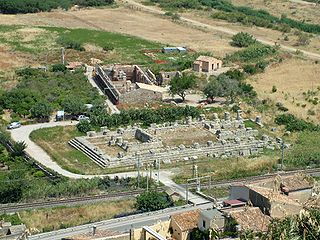Related Research Articles

The Odyssey is one of two major ancient Greek epic poems attributed to Homer. It is one of the oldest extant works of literature still widely read by modern audiences. As with the Iliad, the poem is divided into 24 books. It follows the Greek hero Odysseus, king of Ithaca, and his journey home after the Trojan War. After the war, which lasted ten years, his journey from Troy to Ithaca, via Africa and southern Europe, lasted for ten additional years during which time he encountered many perils and all of his crewmates were killed. In his absence, Odysseus was assumed dead, and his wife Penelope and son Telemachus had to contend with a group of unruly suitors who were competing for Penelope's hand in marriage.

Agrigento is a city on the southern coast of Sicily, Italy and capital of the province of Agrigento.

This is a timeline of ancient Greece from its emergence around 800 BC to its subjection to the Roman Empire in 146 BC.

Telemachus, in Greek mythology, is the son of Odysseus and Penelope, who is a central character in Homer's Odyssey. When Telemachus reached manhood, he visited Pylos and Sparta in search of his wandering father. On his return to Ithaca, he found that Odysseus had reached home before him. Then father and son slew the suitors who had gathered around Penelope. According to later tradition, Telemachus married Circe after Odysseus’ death.

Phalaris was the tyrant of Akragas in Sicily in Magna Graecia, from approximately 570 to 554 BC.

Heraclea Pontica, known in Byzantine and later times as Pontoheraclea, was an ancient city on the coast of Bithynia in Asia Minor, at the mouth of the river Lycus. It was founded by the Greek city-state of Megara in approximately 560–558 BC and was named after Heracles who the Greeks believed entered the underworld at a cave on the adjoining Archerusian cape. The site is now the location of the modern city Karadeniz Ereğli, in the Zonguldak Province of Turkey.

A tyrant, in the modern English usage of the word, is an absolute ruler who is unrestrained by law, or one who has usurped a legitimate ruler's sovereignty. Often portrayed as cruel, tyrants may defend their positions by resorting to repressive means. The original Greek term meant an absolute sovereign who came to power without constitutional right, yet the word had a neutral connotation during the Archaic and early Classical periods. However, Greek philosopher Plato saw tyrannos as a negative word, and on account of the decisive influence of philosophy on politics, deemed tyranny the "fourth and worst disorder of a state."
Tyrants lack "the very faculty that is the instrument of judgment"—reason. The tyrannical man is enslaved because the best part of him (reason) is enslaved, and likewise, the tyrannical state is enslaved, because it too lacks reason and order.
In Greek mythology, Abaris the Hyperborean, son of Seuthes (Σεύθης), was a legendary sage, healer, and priest of Apollo known to the Ancient Greeks. He was supposed to have learned his skills in his homeland of Hyperborea, which he fled during a plague. He was said to be endowed with the gift of prophecy, and along with his Scythian dress, simplicity, and honesty, he created great sensation in Greece, and was held in high esteem.

Polycrates, son of Aeaces, was the tyrant of Samos from the 540s BC to 522 BC. He had a reputation as both a fierce warrior and an enlightened tyrant.

Phalaris arundinacea, or reed canary grass, is a tall, perennial bunchgrass that commonly forms extensive single-species stands along the margins of lakes and streams and in wet open areas, with a wide distribution in Europe, Asia, northern Africa and North America. Other common names for the plant include gardener's-garters and ribbon grass in English, alpiste roseau in French, Rohrglanzgras in German, kusa-yoshi in Japanese, caniço-malhado in Portuguese, and hierba cinta and pasto cinto in Spanish.

The Battle of Himera, supposedly fought on the same day as the Battle of Salamis, or at the same time as the Battle of Thermopylae, saw the Greek forces of Gelon, King of Syracuse, and Theron, tyrant of Agrigentum, defeat the Carthaginian force of Hamilcar the Magonid, ending a Carthaginian bid to restore the deposed tyrant of Himera. The alleged coincidence of this battle with the naval battle of Salamis and the resultant derailing of a Punic-Persian conspiracy aimed at destroying the Greek civilization is rejected by modern scholars. Scholars also agree that the battle led to the crippling of Carthage's power in Sicily for many decades. It was one of the most important battles of the Sicilian Wars.

Himera, was a large and important ancient Greek city situated on the north coast of Sicily at the mouth of the river of the same name, between Panormus and Cephaloedium in the comune of Termini Imerese.

Licata, formerly also Alicata, is a city and comune located on the south coast of Sicily, at the mouth of the Salso River, about midway between Agrigento and Gela. It is a major seaport developed at the turn of the twentieth century, shipping sulphur, the refining of which has made Licata the largest European exporting centre, and asphalt, and at times shipping cheese.
Tyrannicide or tyrannomachia is the killing or assassination of a tyrant or unjust ruler, purportedly for the common good, and usually by one of the tyrant's subjects. Tyrannicide was legally permitted and encouraged in Classical Greece. Often, the term "tyrant" was a justification for political murders by rivals, but in some exceptional cases students of Platonic philosophy risked their lives against tyrants. The killing of Clearchus of Heraclea in 353 BC by a cohort led by his own court philosopher is considered a sincere tyrannicide. A person who carries out a tyrannicide is also called a "tyrannicide".
The Telegony is a lost ancient Greek epic poem about Telegonus, son of Odysseus by Circe. His name is indicative of his birth on Aeaea, far from Odysseus' home of Ithaca. It was part of the Epic Cycle of poems that recounted the myths of the Trojan War as well as the events that led up to and followed it. The story of the Telegony comes chronologically after that of the Odyssey and is the final episode in the Epic Cycle. The poem was sometimes attributed in antiquity to Cinaethon of Sparta, but in one source it is said to have been stolen from Musaeus by Eugamon or Eugammon of Cyrene. The poem comprised two books of verse in dactylic hexameter.

Pisistratus was a politician in ancient Athens, ruling as tyrant in the late 560s, the early 550s and from 546 BC until his death. His unification of Attica, the triangular peninsula of Greece containing Athens, along with economic and cultural improvements laid the groundwork for the later pre-eminence of Athens in ancient Greece. His legacy lies primarily in his institution of the Panathenaic Games, historically assigned the date of 566 BC, and the consequent first attempt at producing a definitive version of the Homeric epics. Pisistratus' championing of the lower class of Athens is an early example of populism. While in power, he did not hesitate to confront the aristocracy and greatly reduce their privileges, confiscating their lands and giving them to the poor. Pisistratus funded many religious and artistic programs, in order to improve the economy and spread the wealth more equally among the Athenian people.

The Apega of Nabis, also known as the Iron Apega, was described by Polybius as an ancient torture device similar to the iron maiden. It was invented by Nabis, a king who ruled Sparta as a tyrant from 207 to 192 BC.

The brazen bull, also known as the bronze bull, Sicilian bull, or bull of Phalaris, was a torture and execution device designed in ancient Greece. According to Diodorus Siculus, recounting the story in Bibliotheca historica, Perilaus (Περίλαος) of Athens invented and proposed it to Phalaris, the tyrant of Akragas, Sicily, as a new means of execution. The bull was said to have been hollow, and made entirely of bronze, with a door in one side. Allegedly, the condemned were locked inside the device, and a fire was set beneath it, heating the metal to the extent that the person within slowly roasted to death. The bull was equipped with an internal acoustic apparatus that converted the screams of the dying into what sounded like the bellows of a bull. The bull's design was such that steam from the cooking flesh of the condemned exited the bull's nostrils, this effect—along with the bull's "bellows"—created the illusion that the bull came to life during every execution. Pindar, who lived less than a century later, expressly associates this instrument of torture with the name of the tyrant Phalaris. Juvenal, in his eighth Satire, lines 81-2, also refers to Phalaris and his bull.

Phalaris is the eleventh studio album by Japanese heavy metal band Dir En Grey, released on June 15, 2022, via Firewall Div./SMEJ.
References
- ↑ Time and Space in Ancient Myth, Religion and Culture. De Gruyter. 2017-10-10. doi:10.1515/9783110535150. ISBN 978-3-11-053515-0.
- ↑ Dyer, Bryan R. (2019-08-29). ""Like Phalaris in Every Way": 3 Maccabees and Its Portrait of Tyranny". Journal for the Study of Judaism. 50 (3): 371–382. doi:10.1163/15700631-15031261. ISSN 1570-0631.